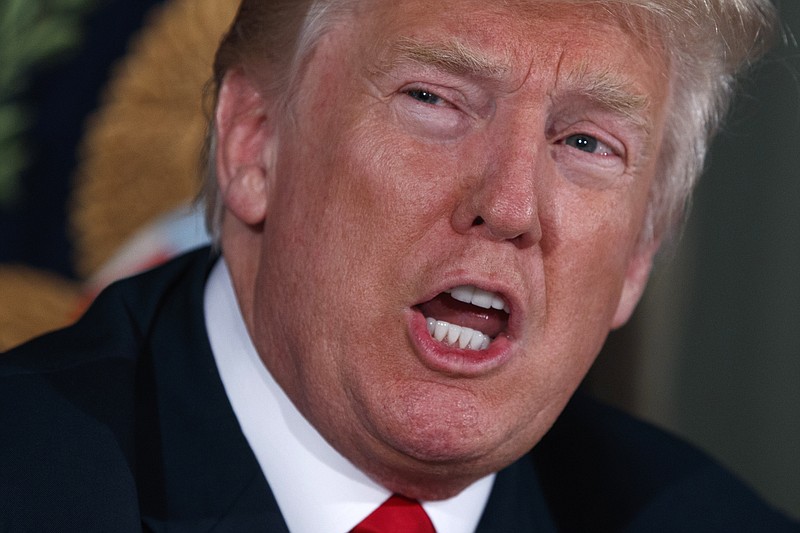BRIDGEWATER, N.J. (AP) - President Donald Trump threatened North Korea "with fire and fury like the world has never seen" Tuesday after reports suggested the communist country has mastered one of the final hurdles to being able to strike the United States with a nuclear missile.
Trump's stern words to the camera at his golf course in Bedminster, New Jersey, sought to match the gravity of North Korea's newfound ability to wed its nuclear warhead with its missiles, including those that may be able to hit the American mainland. The isolated and impoverished dictatorship has strived for decades to match its bombastic military rhetoric with the technical prowess to threaten the U.S. and its Asian allies, and the pace of its breakthroughs is already having far-reaching consequences for stability in the Pacific and beyond.
The nuclear advances were detailed in an official Japanese assessment and a Washington Post story citing U.S. intelligence officials and a confidential Defense Intelligence Agency report. The U.S. now puts the North Korean arsenal at up to 60 nuclear weapons, more than double most assessments by independent experts, according to the Post's reporting.
"North Korea had best not make any more threats to the United States," said a stern-looking Trump, seated with his arms crossed and with his wife beside him. "They will be met with fire and fury like the world has never seen."
"He has been very threatening beyond a normal state. And as I said they will be met with fire, fury and frankly power the likes of which this world has never seen before."
Trump's remarks evoked President Harry Truman's announcement of the U.S. atomic bomb dropped on Hiroshima, Japan, in 1945, in which he warned of "a rain of ruin from the air, the like of which has never been seen on this earth."
The Trump administration considers North Korea to be America's greatest national security threat and tensions have steadily escalated this year.
Pyongyang had threatened the U.S. in response to the U.N. Security Council's adoption this weekend of new, tougher sanctions spearheaded by Washington. The sanctions followed groundbreaking long-range missile tests last month that showed the North could potentially reach the continental United States with its missiles. The newly revealed U.S. intelligence assessment indicates those missiles can carry nuclear warheads.
Denouncing the U.N. sanctions through state media, the North warned: "We will make the U.S. pay by a thousand-fold for all the heinous crimes it commits against the state and people of this country."
It is an ambition decades in the making. North Korea began producing fissile material for bombs in the early 1990s and conducted its first nuclear test explosion in 2006. Four subsequent nuclear tests, the latest a year ago, have accelerated progress on miniaturizing a device - something North Korea already claimed it could do. Over that span, multiple U.S. presidents have tried and failed to coax or pressure Pyongyang into abandoning its nuclear ambitions.
The secrecy of the North's nuclear program and the underground nature of its test explosions make it very difficult to properly assess its claims. However, the new assessments from Japan and the U.S. suggest doubts over the North's abilities are receding.
In an annual report, Japan's Defense Ministry on Tuesday concluded "it is possible that North Korea has achieved the miniaturization of nuclear weapons and has developed nuclear warheads." Japan, a key U.S. ally, is a potential, front-line target of North Korean aggression.
The Post story, citing unnamed U.S. intelligence officials, went further. It said the Defense Intelligence Agency analysis, completed last month, assessed North Korea has produced nuclear weapons for ballistic missile delivery, including by intercontinental missiles.
Officials at the agency wouldn't comment Tuesday. The Office of the Director of National Intelligence also wouldn't discuss the report.
It's unclear how North Korea's new capabilities will immediately affect how the U.S. approaches the country's regular missile launches and occasional nuclear tests. The U.S. military has never attempted to shoot a North Korean missile out of the sky, deeming all previous tests to pose no threat to the United States. The U.S. could weigh military action if the threat perception changes.
Not all technical hurdles have been overcome with the missiles, however. North Korea is still believed to lack expertise to allow a missile to re-enter the Earth's atmosphere without burning up. Another work-in-progress: the ability to strike targets with accuracy.
After the launches, missile expert John Schilling concluded the intercontinental missile still needed another year or two to achieve "full operational capability."

